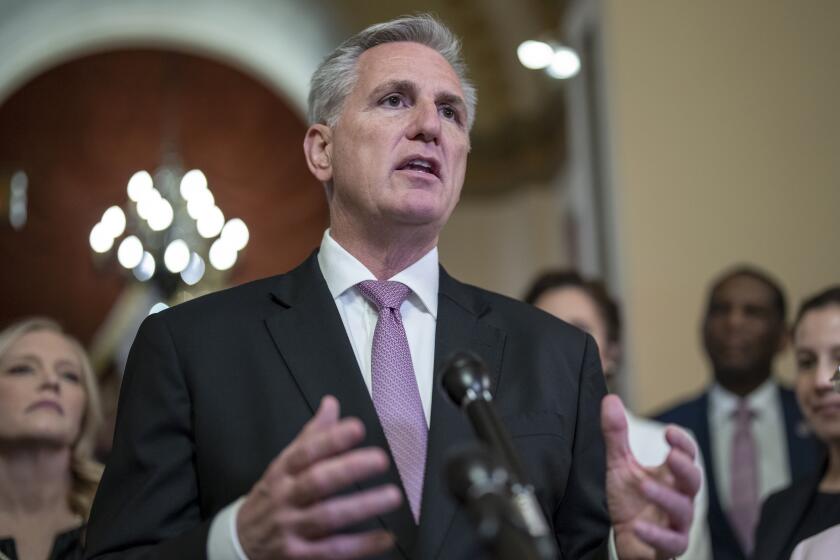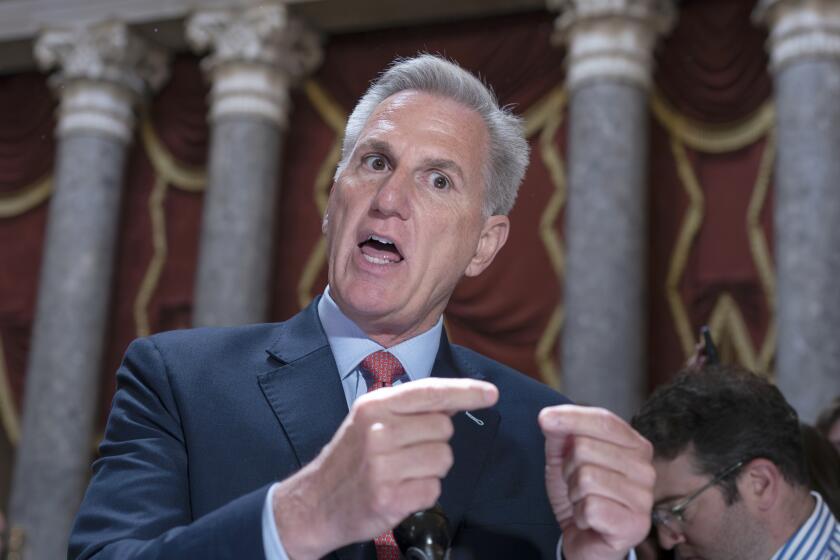Don’t call the debt-ceiling deal a success. It shouldn’t have been a crisis at all

- Share via
The arsonists are taking credit for putting out the fire.
Late Saturday night and again Sunday morning, House Speaker Kevin McCarthy and two of his lieutenants were providing self-congratulatory spin to scrums of reporters at the Capitol on a holiday weekend, declaring their success at ending an economic crisis Republicans unnecessarily provoked.
They didn’t describe their deal with President Biden that way, of course. But that’s what we’ve been enduring — needless brinkmanship that’s undermined global confidence in the nation’s financial reliability and in the dollar as the world’s reserve currency, and still could spark default and a recession.
Opinion Columnist
Jackie Calmes
Jackie Calmes brings a critical eye to the national political scene. She has decades of experience covering the White House and Congress.
All for the relatively modest spending cuts and policy concessions McCarthy extracted, which came at some immediate cost and will do little to reduce long-term debt, especially if Republicans extend the Trump tax cuts, as they propose. And this manufactured crisis isn’t over yet, notwithstanding the Republicans’ back-patting calisthenics. The “budget agreement in principle” must make it into law.
Here’s what would make this whole mess worth it: Adding a provision to repeal or neutralize the World War I-era law that created the debt limit in the first place.
OK, that won’t happen right away. But I predict someday it will, if only because the foot-shooting spectacle that the law invites is an embarrassment and no way for a great power to govern. (Only one other developed nation, Denmark, has a debt limit.)
Treasury Secretary Janet Yellen has long opposed the debt limit, including when she chaired the Federal Reserve. “I believe it is very destructive to put the president and myself, as Treasury secretary, in a situation where we might be unable to pay the bills that result from [Congress’] past decisions,” she said in 2021 and reiterated this month to an international audience.
Her boss, alas, didn’t get the memo. Biden, ever the tradition-bound deal-maker, said last October as Democrats talked of repealing the senseless law, “You mean, just say we don’t have a debt limit? No. That would be irresponsible.”
The rich won’t be hurt a bit by the Biden/McCarthy debt ceiling deal. It’s the poor who will pay. That was Republicans’ priority all along.
Let’s hope Yellen schools him.
What’s irresponsible is Republicans’ weaponization of the law. They’ve perverted what was originally a fiscal reform to help Congress oversee Treasury’s borrowing, making it into a recurring hostage-and-ransom scheme — when a Democrat is president.
Such a ploy is arguably unconstitutional, a violation of both the 14th Amendment mandate that all government obligations be met and Article II’s requirement that a president execute the laws. That would seem to include laws committing the nation to various spending commitments, right?
But a constitutional challenge to the debt-limit law would be complicated and unpredictable. In any case, it’s out of the question with default looming. (Biden said Sunday he’d consider such a challenge “a year or two from now.”)
We shouldn’t have to resort to the courts anyway; Congress should simply cast a bipartisan vote to end the statutory limit.
These fights over raising it are a disservice to lawmakers’ constituents: They’re mind-numbingly misleading. Republicans pose as fiscal conservatives by opposing a higher debt ceiling unless they get spending cuts and other concessions they couldn’t otherwise pass in the regular budget process. The fiscally conservative thing to do is to pay the bills incurred by both parties’ spending and tax-cutting decisions.
Faced with writing appropriations bills that match the cuts in their debt ceiling proposal, the GOP struggles to muster the votes
The deal McCarthy has cut illustrates the sleight of hand. It would do nothing to rein in the real drivers of what is unsustainable growth in the nation’s debt: Social Security, Medicare and Medicaid benefits for the huge population of aging baby-boomers; an ever-growing Pentagon budget; and insufficient revenues given the excessive tax cuts in each of the past two decades.
The standoff itself has actually added to the deficit. Even if the nation averts catastrophe, the uncertainty on Wall Street and among America’s bondholders worldwide has caused economic damage — just as it did when Republicans held the debt limit hostage in 2011 and 2013. Taxpayers foot the bill. An analysis published last week by the Brookings Institution cited the large premium being charged on Treasury securities maturing in June, a sign of financial markets’ fear of delayed payments.
Some of the concessions from Biden that Republicans are crowing about the most have negligible impact on deficits, if any. For example, a proposed expansion of work requirements for able beneficiaries of food assistance and welfare programs. That’s not debt reduction; it’s grafting from the right-wing policy wish list.
The McCarthy-Biden deal had to be translated into legislative language and dirty details, amid early raspberries from the right and the left. Expect more raspberries as House lawmakers get 72 hours to review the package. It then must be passed by the narrowly divided House and Senate, which in turn must iron out their differences. And all of this must happen before June 5, when Yellen says the government will exceed its borrowing limit.
What could go wrong? Plenty, when you’re dealing with a Republican House majority that put McCarthy through a humiliating 15 votes just to get elected speaker. Still, I’m betting there will be enough support to offset defections on the left and right and pass the package.
That would raise the debt limit enough to get past the 2024 elections. The fire would be out, for now. But the arsonists will be back — unless Congress or the Supreme Court takes away their matches.
More to Read
Get the latest from Jackie Calmes
Commentary on politics and more from award-winning opinion columnist.
You may occasionally receive promotional content from the Los Angeles Times.













